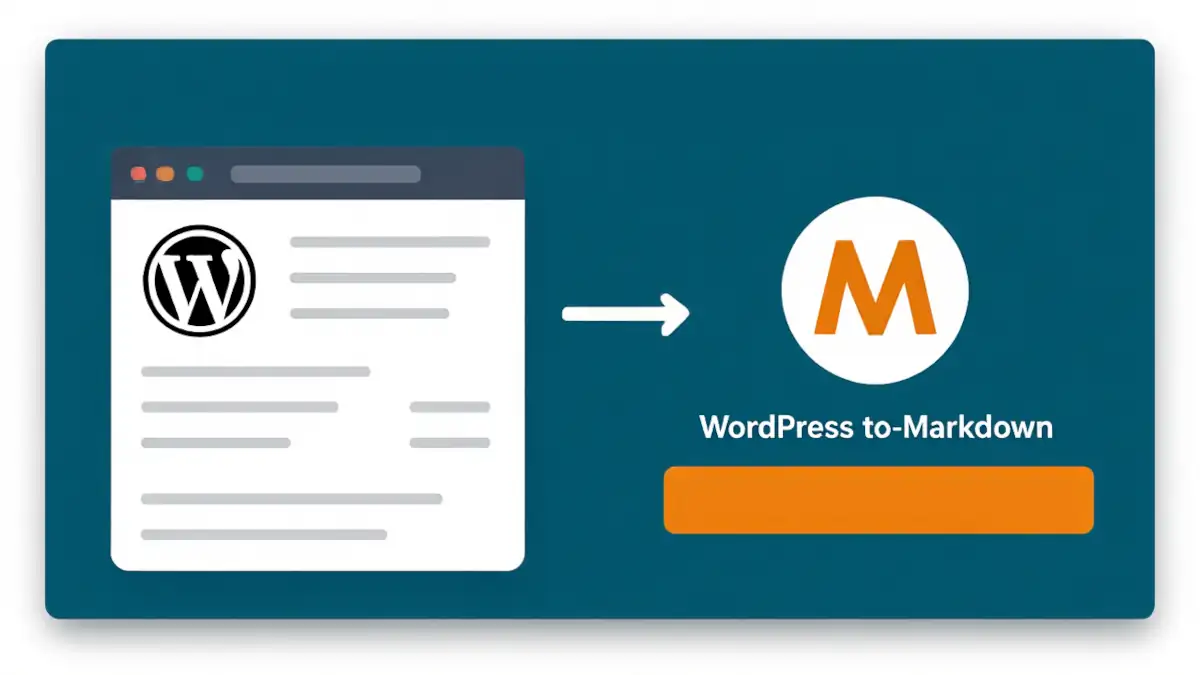How to Export a WordPress Post to Markdown

Do you want to convert a WordPress article into Markdown (with front matter, images, and internal links)? This step-by-step guide walks you through the process. We’ll start with the easiest-looking option (Ultimate Markdown), dig into its limits, and explore free alternatives, CLI tools, and static site plugins for Hugo or Jekyll. By the end, you’ll know exactly which method fits your workflow.
The main idea: Ultimate Markdown seems like the most “plug-and-play” solution, but the free version doesn’t fully support exporting a single post to Markdown. Free alternatives often focus on full-site exports or require manual setup. None are perfect, but depending on your needs (one article or the entire site), you can choose the right path.
1. Ultimate Markdown: a promising option (with caveats)
1.1 What Ultimate Markdown offers
Ultimate Markdown is a WordPress plugin designed to manage Markdown content directly inside WordPress. It handles imports, exports, conversion, front matter, and live HTML preview. It integrates tightly with the Gutenberg editor (but not so much with the Classic Editor). Many users praise its strong support and wide feature set (source: official plugin page and user feedback).
Once activated, you’ll see an “Export Markdown” option in the post editor sidebar, letting you export your content as Markdown. The plugin can also perform a bulk export of all Markdown-based pages and posts via its own menu.
But that’s where the issues begin.
1.2 The limit of the free version
If you’re using the free version of Ultimate Markdown, the “Export WordPress post to Markdown” option doesn’t fully work. In practice, it doesn’t export the entire post with images, internal links, and YAML front matter.
Advanced export features (compressed Markdown archives, bulk export, multiple parsers, REST API for remote document management) are part of the Pro / Premium version (source: plugin documentation and user reviews).
So, if your goal is to export a single WordPress post to Markdown, Ultimate Markdown Pro is an elegant solution. But if you prefer not to pay, you’ll need another method.
1.3 Summary: why Ultimate Markdown is appealing but limited for full export
- Direct WordPress integration, familiar interface
- Good Pro support and advanced export features
- Free version too limited for clean single-post export
- Pro version is paid
- No automatic image downloads in some setups
- May not work with Classic Editor or third-party builders
In short, Ultimate Markdown is polished if you’re willing to pay or accept its limits. Next, let’s explore the free alternatives.
2. Free alternatives and external tools
2.1 Node.js script: wordpress-export-to-markdown
This open-source script is one of the most reliable ways to convert WordPress exports into Markdown. It runs outside WordPress from your command line.
Main process:
- In WordPress, go to Tools > Export and download the XML file containing all your posts and pages.
- On your computer (with Node.js installed), run npx
wordpress-export-to-markdown. - The script launches an interactive wizard asking for the XML path, output folder, folder structure (year/month), whether to download images, etc.
- It generates one Markdown file per post, including YAML front matter (title, date, categories) and downloads the attached images.
- Result: a clean, organized set of .md files ready to import into Hugo, Jekyll, or Gatsby.
Advantages:
- Free and open source
- Great for full-site export
- Automatically downloads images
Disadvantages:
- Not ideal for a single post export (you must export all, then isolate one file)
- Requires basic command-line knowledge
- Needs Node.js installed locally
When to use it:
- For full-site migration
- For exporting multiple posts
- When you prefer technical, open-source solutions
2.2 Plugins for Hugo, Jekyll, or static Markdown export
If your target is a static site generator, specialized plugins exist:
- WordPress to Hugo Exporter converts posts and pages to Markdown with YAML front matter.
- Jekyll Exporter exports posts, pages, categories, and media for Jekyll.
- Similar plugins exist for other static site frameworks.
These are built for full WordPress to static site migration, not single-post exports from the editor. Still, they’re valuable if you plan to move to a static site setup.
Pros:
- WordPress integration
- Markdown export tailored to static generators
- Efficient for large-scale migration
Cons:
- Limited single-post control
- Maintenance quality varies
- Image and link handling may need manual review
3. Quick comparison: which method fits your needs
| Main goal | Recommended method | Key advantages | Main drawbacks |
|---|---|---|---|
| Export a single post to Markdown | Ultimate Markdown Pro | Built-in interface, direct export | Free version limited |
| Export several posts | Free Markdown plugins | Easy UI, batch export (limited) | Fewer advanced options |
| Export entire site / migrate | wordpress-export-to-markdown | Free, complete export, image download | Requires CLI use |
| Migrate to Hugo or Jekyll | WordPress to Hugo / Jekyll Exporter | Static-site ready Markdown | Not post-specific |
4. Step-by-step guide by user profile
4.1 You want to export a single post (no terminal)
The most straightforward option is Ultimate Markdown, provided you use the Pro version. After installing it from the WordPress plugin directory, activate it and open a post. In Gutenberg’s sidebar, you’ll see Export to Markdown. With one click, you download your .md file containing the text and basic metadata.
If you don’t want the paid version, you can manually export your post as HTML from WordPress and convert it to Markdown using an online tool or Pandoc.
Manual method:
- Open your post in “Code” or HTML view.
- Copy all content.
- Paste it into an online converter such as htmlmarkdown.com.
- Download the .md result.
- Manually fix image and link paths.
It’s not automated, but it’s free and works for small needs.
4.2 You want to export multiple posts
If your goal is to convert your entire site or many WordPress posts, the wordpress-export-to-markdown script is more efficient. Created by lonekorean, this open-source Node.js script converts your WordPress XML export into structured Markdown files.
Steps:
- In WordPress, go to Tools > Export and download the XML file.
- Install Node.js on your system.
- Run the following in your terminal:
npx wordpress-export-to-markdown - Follow the interactive prompts (XML path, output folder, download images, etc.).
- The tool creates a folder with one Markdown file per post, complete with front matter (title, date, categories) and local images.
Tip: After export, filter or move the Markdown files you need.
4.3 You plan to migrate to a static site
Plugins like WordPress to Hugo Exporter or Jekyll Exporter are designed for full static site migration. They export posts and pages in Markdown with specific front matter for each framework.
Strengths:
- No terminal required
- Outputs directly compatible Markdown files
Weaknesses:
- No granular control (exports everything)
- Maintenance may vary
Alternative: WP2Static WP2Static is open source and can integrate a Markdown Exporter add-on available on GitHub. This combination lets you generate Markdown instead of HTML. However, it’s more technical and intended for full static workflows, not single post exports.
5. Handling images, metadata, and structure
Exporting a WordPress post to Markdown isn’t just about text. You also need to handle:
- Images: they must be downloaded locally, and links updated. The wordpress-export-to-markdown script does this automatically.
- Metadata (front matter): good tools add YAML headers with title, date, and tags so you can keep structure intact.
- Internal links: always double-check links between posts after export, especially for static sites.
For clean results, a full XML conversion via the CLI method remains the most reliable. Plugin-only options are easier but rarely complete.
6. Frequently asked questions
How can I export a WordPress post to Markdown for free?
Use Tools > Export to get your XML file, then run the open-source wordpress-export-to-markdown script. It’s free but requires minimal technical setup.
Does Ultimate Markdown free version export to Markdown?
No. The free edition doesn’t support full Markdown export with front matter and images. Only the Pro version enables complete export.
Can I export post images automatically?
Yes, the wordpress-export-to-markdown script automatically downloads and rewrites image paths. Most free plugins do not.
Are Hugo and Jekyll exporters suitable for single posts?
Not really. They’re meant for full-site migration rather than one post at a time.
Is WP2Static worth it for single post export?
No. It’s powerful for complete static site generation but unnecessary for a single post.
7. Choosing the right approach
Exporting a WordPress post to Markdown is more complex than it appears.
- For simplicity, Ultimate Markdown Pro provides the smoothest experience but requires payment.
- For free and technical users, wordpress-export-to-markdown is unbeatable in accuracy and control.
- For full static migrations, WordPress to Hugo Exporter, Jekyll Exporter, or WP2Static are best suited.
Each serves a distinct goal:
- Simplicity
- Control and precision
- Full migration
| Criteria | Plugin (Ultimate Markdown) | Script (wordpress-export-to-markdown) | Static Export (WP2Static, Hugo/Jekyll) |
|---|---|---|---|
| Target users | Regular WordPress users | Developers comfortable with CLI | Admins migrating whole sites |
| Installation | From WordPress plugin directory | Via Node.js (npx wordpress-export-to-markdown) | WordPress plugin + setup |
| Export type | Single post or batch (Pro only) | Full-site Markdown export | Full-site HTML or Markdown |
| Front matter | Basic or full (Pro) | Complete (title, date, categories) | Static-site ready |
| Image export | Manual | Automatic | Depends on plugin |
| Ease of use | Very easy | Moderate (interactive CLI) | Moderate to complex |
| Speed | Fast for one post | Fast even for large sites | Depends on site size |
| Compatibility | Gutenberg only | All editors | All WordPress installs |
| Cost | Free (limited) or paid | Free and open source | Free or with optional add-ons |
| Best for | Occasional export | Bulk or precise export | Full static site conversion |
8. Final thoughts
Exporting a WordPress article to Markdown isn’t a one-click process. Ultimate Markdown looks ideal at first, but full export features are paid. Free tools like wordpress-export-to-markdown or WP2Static are powerful yet oriented toward full-site use. Dedicated Hugo or Jekyll exporters are great for static workflows but lack flexibility for individual posts.
In summary:
- For occasional, simple needs, choose a GUI plugin.
- For technical or large-scale use, go for the XML + Node.js script method.
- For static site migration, rely on Hugo, Jekyll, or WP2Static exporters.
Markdown freedom also means tool freedom: pick the one that best fits your workflow.
If you use a consent banner (CMP), make sure it is properly configured and properly verified to avoid losing analytics data and advertising revenue with Google Analytics 4 and AdSense, our guide explains how to check this step by step.
Your comments enrich our articles, so don’t hesitate to share your thoughts! Sharing on social media helps us a lot. Thank you for your support!






